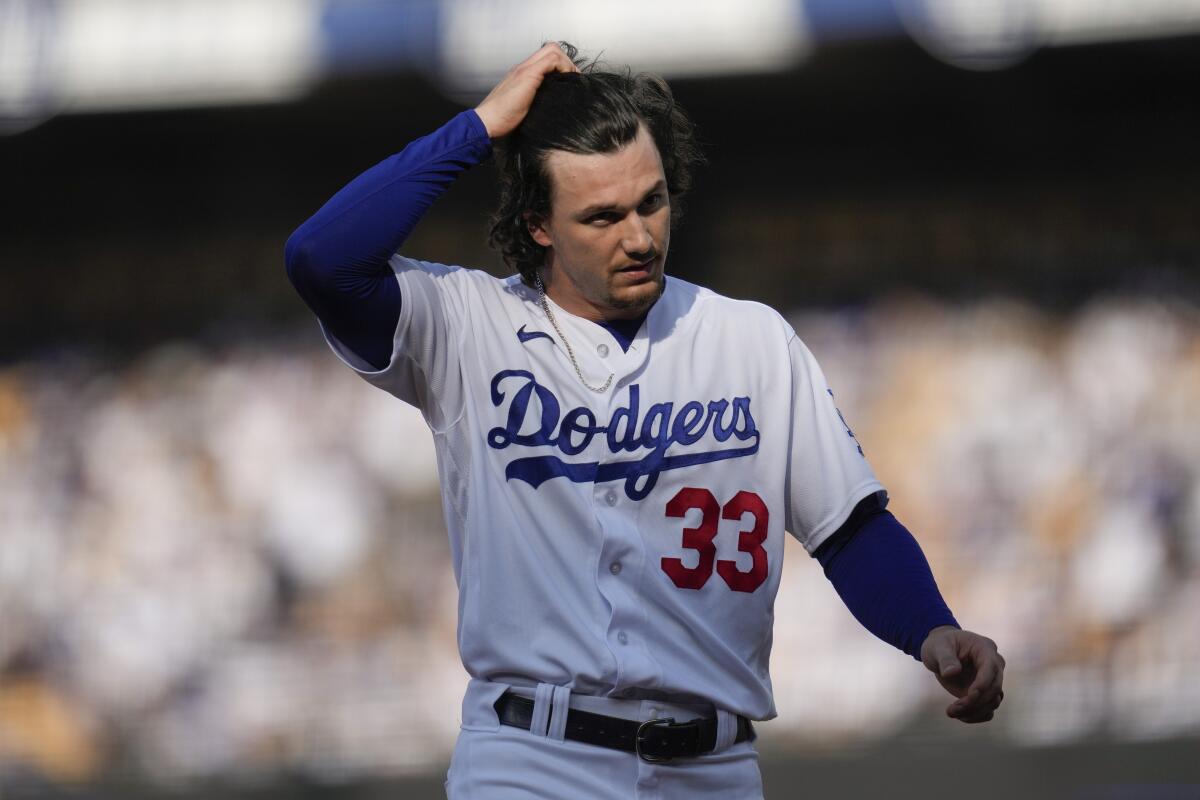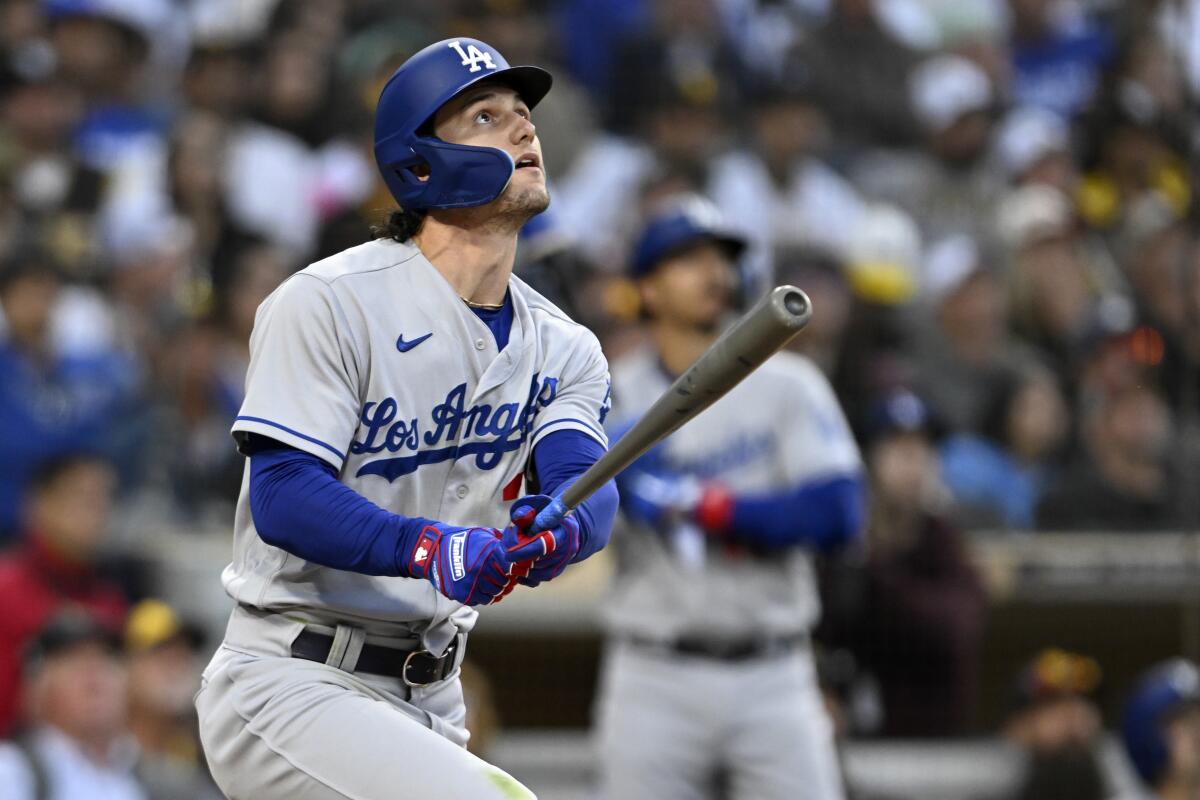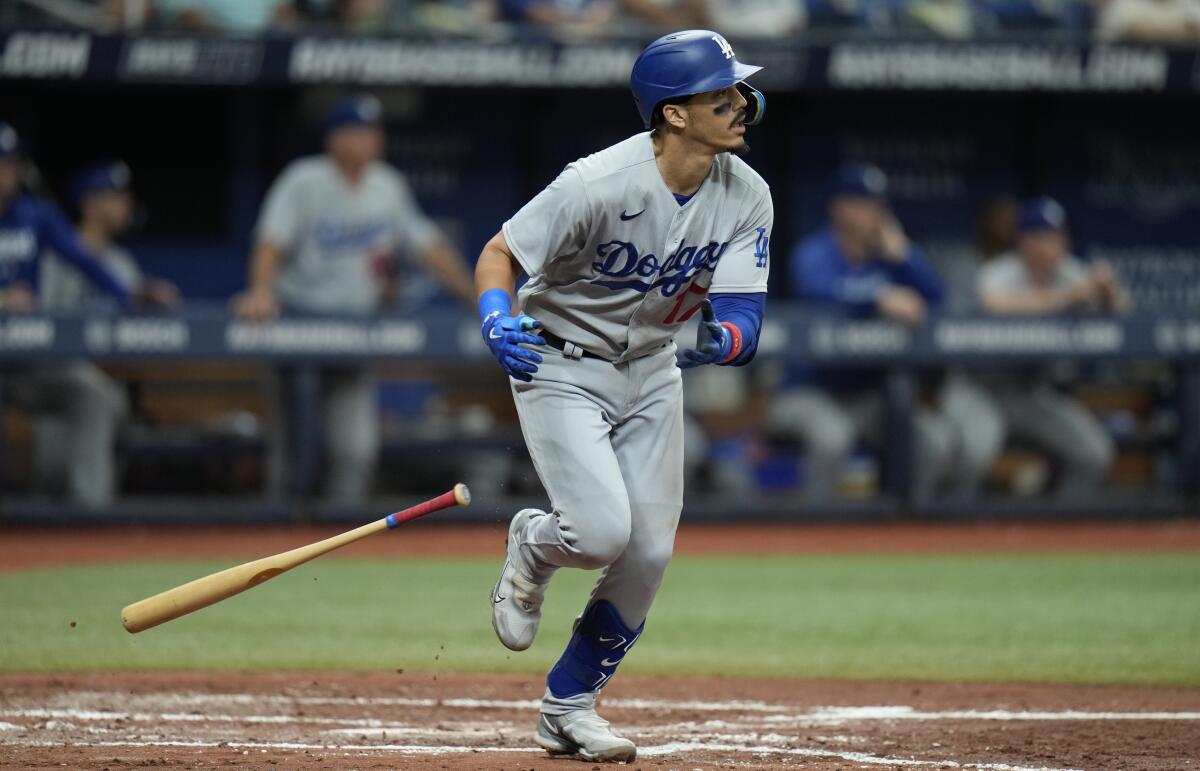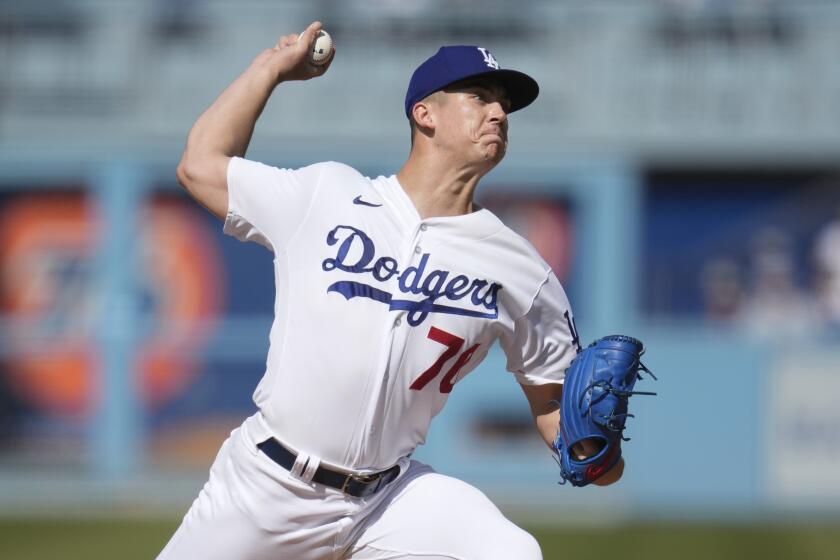How Dodgers’ James Outman, Miguel Vargas have navigated growing pains of rookie season

- Share via
CINCINNATI — On a day the Dodgers had no formal batting practice, and no organized teamwide drills, three players still raced around the field at Dodger Stadium before Sunday’s game against the New York Yankees.
One was Chris Taylor, the lone veteran of the group taking a few pregame grounders at shortstop before starting at the position later that night.
The others were the Dodgers’ two regularly starting rookies, Miguel Vargas and James Outman — each putting in extra time with the coaching staff, each trying to accelerate their learning curves after up-and-down starts to their first MLB full seasons.
Since the beginning of the year, Vargas and Outman have been fixtures during such pregame exercises.
Vargas will rotate around the infield almost every day, taking ground balls under the watchful eye of everyone from infield coach Dino Ebel, to club special assistant Chris Woodward, to MVP-winning teammate Mookie Betts.
Outman will do the same in the outfield, reading fly balls and working on his throws with outfield coach Clayton McCullough and veteran teammates like Jason Heyward.
It’s a small window into what the Dodgers are hoping will be a fruitful process for their two former prospects, who have each flashed potential over the first couple of months but also endured inevitable growing pains.
Outman was the National League’s rookie of the month in April. Vargas was one of the Dodgers’ hotter hitters for much of May.
In response to the Dodgers’ plan to honor the Sisters of Perpetual Indulgence, the Catholic League launched an L.A. radio campaign urging a Pride Night boycott.
Yet, they’ve each suffered extended slumps: Vargas early in the year while tinkering with his swing; Outman of late while adjusting to a steady diet of high fastballs.
They’ve each been culpable for defensive mistakes: Outman struggling to read some fly balls in center; Vargas occasionally getting crossed up fielding grounders to his left.
And they’ve each needed time to get settled into the majors, trying to learn from bumps in a road the team still believes will result in them being key contributors by the end of the season.
“I think they’ll both get to the [level of] consistency that big league ballplayers get to, at some point,” manager Dave Roberts said. “We need it some time this season. [We’ll be] counting on them down the road. But they’ve got a great support group with their coaches and their teammates. To me, that’s really encouraging.”
Outman has encountered wilder swings over the season’s first couple of months.
In March and April, he looked like a star in the making. Two hits on opening day. Seven home runs in his first 29 games. Reliable defense at all three outfield spots. And a few particularly memorable moments — most notably, a game-winning, ninth-inning grand slam at Wrigley Field.
“[That’s when] I felt like I was a big leaguer,” Outman said of that Chicago series.
Since then, opponents have started treating him like more of a legitimate big league threat too.

Teams have started attacking the 26-year-old with high heat, crowding him with up-and-in fastballs after he demonstrated his ability to lay off low spin and wait for mistakes over the plate.
In the minors, Outman had success against elevated velocity. But against major league arms, the results haven’t been the same.
Since the start of May, he is batting .161 with two home runs and strikeouts in almost 38% of his at-bats.
His defense has also slipped, with misreads in center becoming concerningly more common.
“Everything is magnified [in the majors],” said Outman, whose .773 on-base-plus-slugging percentage still ranks slightly above league average. “But I just keep reminding myself, it’s still the same game. Just got to try to keep a level head.”
Roberts noted the rookie has looked a little too “in between” at the plate, unable to fight off fastballs at the top of the zone, but also more liable to chase secondary stuff down below as well.
“The last few weeks, [that] has been more prominent than we’ve seen,” Roberts said. “So I think the message, from the hitting coaches to James himself, is have a plan and have conviction. When you get caught in between, things are starting to speed up a little bit.”
Yet, in a dugout interview this weekend, Outman’s confidence hardly seemed shaken. He propped his feet up on a railing. He talked about what a “blast” it’s been being part of a first-place team.
He even chuckled about a recent autograph signing he held in Sherman Oaks— which, despite his current slump, was still attended by so many fans he had time for only 30-second greetings with each.
“I felt bad for them, honestly, because they waited in line for so long,” Outman said, reflecting on his latest reminder of how different MLB stardom can be. “But, I feel fortunate people are willing to do that.”
Vargas’ season has followed an opposite trajectory.
Early on, the 23-year-old infielder struggled with his swing, batting .202 (albeit with 21 walks) over his first 28 games.

Since then, the second baseman has tapped back into the confidence that originally lifted him to the major leagues — and was on full display in his debut last year, when he doubled and stole third in his first at-bat — with the help of some swing changes following an early-season finger injury.
Beginning with a four-hit, three-double outburst May 2 against Philadelphia, Vargas is batting .247 in his last 27 games. Of his 24 hits in that span, 14 have been for extra-bases.
“I feel pretty good,” he said recently, after delivering one of his 13 doubles this season in a game at Atlanta. “Trying to be more consistent at the plate.”
While there was little doubt his swing would eventually come around — Vargas’ .745 OPS has him back at league average — his strides on defense have been even more telling about his development in the majors.
Playing second base for the first time in his pro career, Vargas doesn’t grade out as a great defender (among 45 qualified MLB second baseman, he is 35th in outs above average). But he hasn’t been as big of a liability as some feared, either.
He has gotten more comfortable on routine grounders. He has displayed a big arm and cool knack for turning double plays. Most of all, he has applied the lessons Ebel and others have preached to him during his daily pregame drills.
A quick look at the opposition in the NL West, including those surprising Arizona Diamondbacks and disappointing San Diego Padres.
“Hardest worker on the team,” Ebel said. “He gets it. He’s absorbing it … And slowly, every day, we got to find a way to get better.”
Lately, it has led to a ritual between Ebel and Vargas before the start of their work each day.
The coach will ask the rookie, “What’s your goal?”
Without hesitation, Vargas will respond: “Be the best defender on the team — but don’t tell anybody.”
More to Read
Are you a true-blue fan?
Get our Dodgers Dugout newsletter for insights, news and much more.
You may occasionally receive promotional content from the Los Angeles Times.












